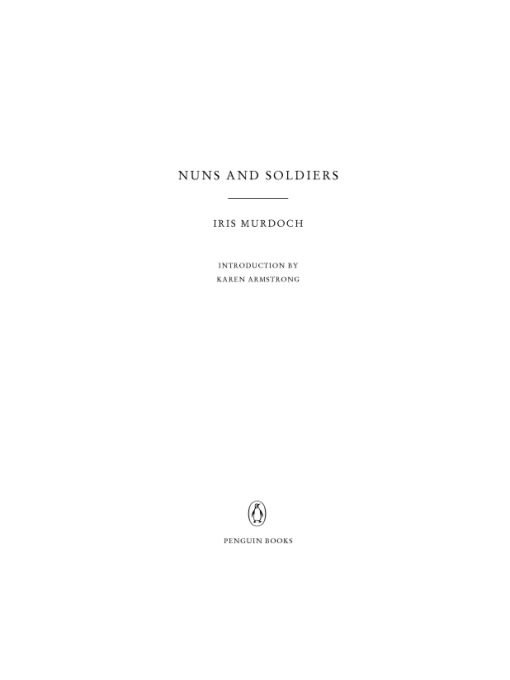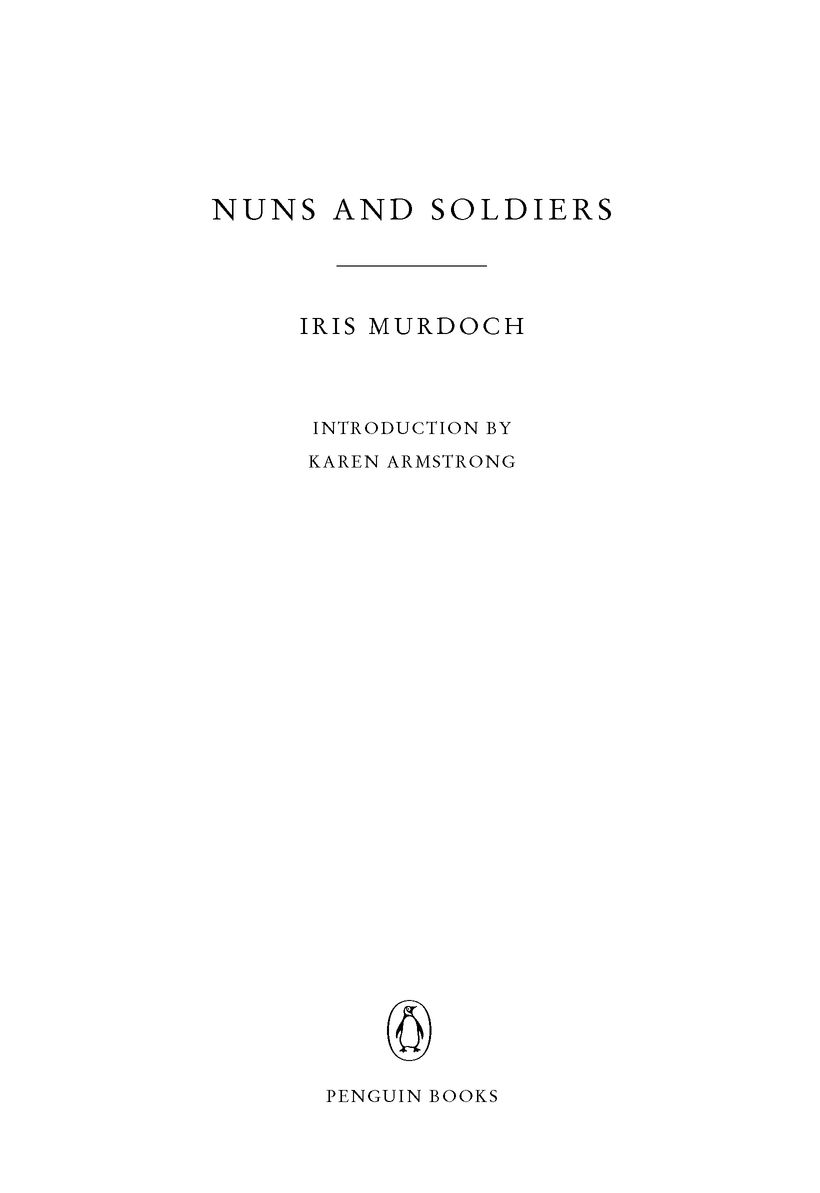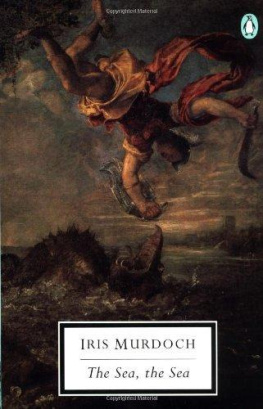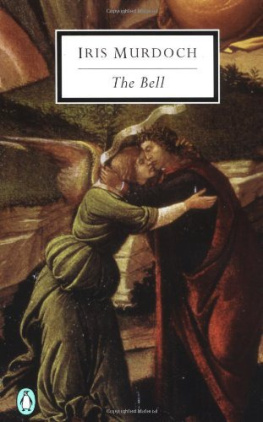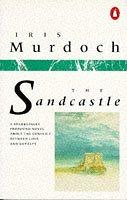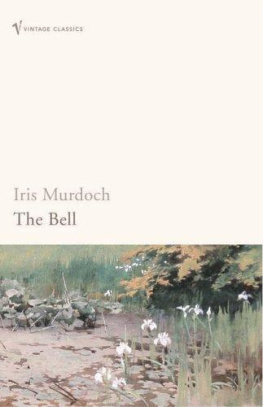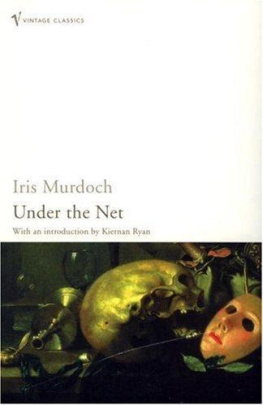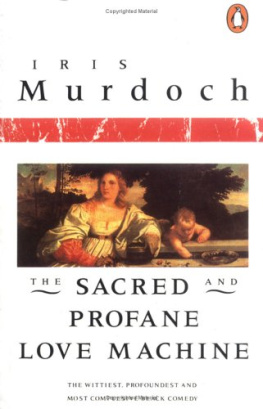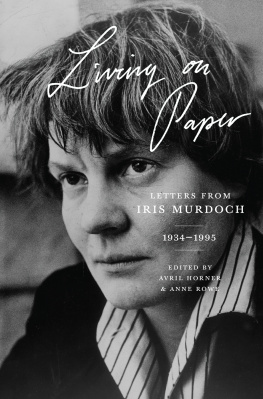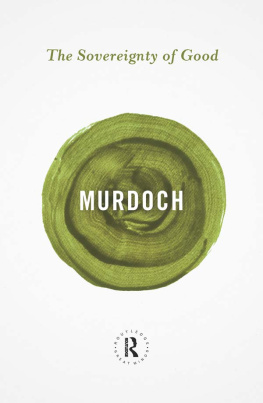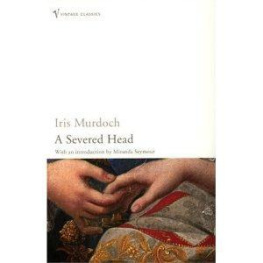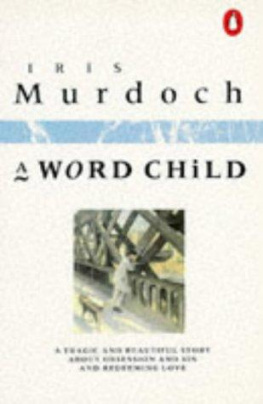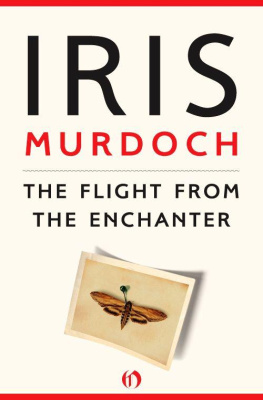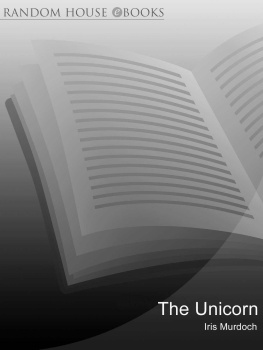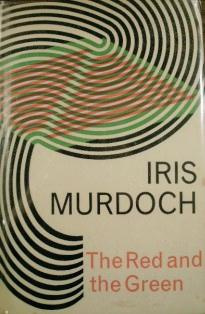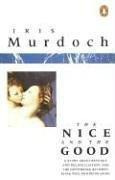Table of Contents
PENGUIN TWENTIETH-CENTURY CLASSICS NUNS AND SOLDIERS
Iris Murdoch was born in Dublin in 1919, grew up in London, and received her university education at Oxford and later at Cambridge. In 1948 she became a Fellow of St. Annes College, Oxford, where for many years she taught philosophy. In 1987 she was appointed Dame Commander, Order of the British Empire. She died on February 8, 1999. Murdoch wrote twenty-six novels, including Under the Net, her writing debut of 1954, and the Booker Prize-winning The Sea, The Sea (1978). She received a number of other literary awards, among them the James Tait Black Memorial Prize for The Black Prince (1973) and the Whit-bread Prize for The Sacred and Profane Love Machine (1974). Her works of philosophy include Sartre: Romantic Rationalist, Metaphysics as a Guide to Morals (1993), and Existentialists and Mystics (1998). She also wrote several plays and a volume of poetry.
A former Catholic nun, Karen Armstrong teaches at Leo Baeck College for the Study of Judaism in England. Her books include The Battle for God; A History of God: The 4,000-Year Quest of Judaism, Christianity and Islam; Jerusalem: One City, Three Faiths; In the Beginning: A New Interpretation of Genesis; Islam: A Short History; and her biography, Buddha, published in the Penguin Lives series.
By the same author
Philosophy
SARTRE, ROMANTIC RATIONALIST
THE FIRE AND THE SUN
ACOSTOS: TWO PLATONIC DIALOGUES
METAPHYSICS AS A GUIDE TO MORALS
EXISTENTIALISTS AND MYSTICS
Fiction
UNDER THE NET
THE FLIGHT FROM THE ENCHANTER
THE SAND CASTLE
THE BELL
SEVERED HEAD
AN UNOFFICIAL ROSE
THE UNICORN
THE ITALIAN GIRL
THE RED AND THE GREEN
THE TIME OF THE ANGELS
THE NICE AND THE GOOD
BRUNOS DREAM
A FAIRLY HONOURABLE DEFEAT
AN ACCIDENTAL MAN
THE BLACK PRINCE
THE SACRED AND PROFANE LOVE MACHINE
A WORD CHILD
HENRY AND CATO
THE SEA, THE SEA
NUNS AND SOLDIERS
THE PHILOSOPHERS PUPIL
THE GOOD APPRENTICE
THE BOOK AND THE BROTHERHOOD
THE MESSAGE TO THE PLANET
THE GREEN KNIGHT
JACKSONS DILEMMA
Plays
A SEVERED HEAD (with J. B. Priestley)
THE ITALIAN GIRL (with James Saunders)
THE THREE ARROWS
THE SERVANTS AND THE SNOW
THE BLACK PRINCE
Poetry
A YEAR OF BIRDS
(Illustrated by Reynolds Stone)
INTRODUCTION
It is difficult at first, perhaps, to imagine two groups of people who have less in common than the nuns and soldiers of the title, but a possible link is suggested in the very first scene of the novel. Guy Openshaw is dying and, with the terrible eloquence of so many of Iris Murdochs characters, he unflinchingly contemplates the prospect of his imminent extinction. Does one, he asks, die as an animal, in exhaustion or in some kind of trance? Our breaths are numbered, he remarks. I can see the imaginable number of my own - just coming - into view. He wants to die well, but how is it done? When will he decide to stop shaving forever? Guys mind is beginning to fragment: he utters disconnected, mysteriously elusive phrases, which disturb his wife Gertrude and his friends. They show that he has already started the journey into that future when I wont exist any more.
Human beings are the only animals who have to live with the knowledge of their own mortality. This fear of annihilation, of nonbeing, is a constant reality in our lives. We are creatures who fall very easily into despair, and we have been ingenious in our search for solutions that will save our sanity. Many of us prefer not to think of the void that awaits us some time in the future, but we can never entirely block out the reality of death. Other people choose to confront the spectre, and to lose their fear of extinction by meeting it head on. This is the task of the soldier. He undergoes a rigorous training that enables him to walk directly into the firing line, ignoring, for what he sees as a higher good, that clamorous instinct for self-preservation which has enabled our species to survive. The soldiers disciplined lack of self-regard has long been seen by poets and philosophers as an emblem of human courage. And yet this heroism also reveals the tragedy of our predicament, because it brings no special dispensation. Homers military heroes all fear death, because they know that it leads only to a shadowy nonexistence in the underworld. The single appropriate response, as they see it, is to behave nobly in the face of this unavoidable fate.
But there is another form of courage, which has fallen somewhat into disrepute in our secularized society, but which had also been hailed as heroic. This is the path of the monk, the nun and the mystic, who voluntarily adopt a lifestyle that has been carefully designed to quench the selfishness and egotism which, they believe, hold human beings back from their full potential. The Buddha, for example, was not seen by his contemporaries in the sixth century B.C.E. as a feeble, deluded drop-out when he left the world to pursue the spiritual life; he was often described in martial terms, as a young nobleman capable of leading a crack army or a troop of elephants. An ascetic was seen as a pioneer, who, at great cost to himself, faced up to the void to bring some vision of hope to more ordinary mortals. The monastic life has emerged in strikingly similar forms in nearly all cultures, and must, therefore, fulfil a need for many men and women. It has been found that the monastic regime and such disciplines as classical yoga or contemplative prayer constitute a devastating assault on the ego and eventually take the I out of the thinking of a skilled practitioner. Like the soldier, therefore, the nun also seeks an experience of annihilation, but if she is sufficiently dedicated, she discovers that this death to self brings her an enhanced mode of being, a transcendence that gives her a sense of infinity and eternity in this mortal life. This transcendence has been called many things: Nirvana, the Tao, the Sacred or Brahman. Buddhists would claim that there is nothing supernatural about it but that it is an essential component of our human nature. Jews, Christians, and Muslims, however, have personalized this transcendence and called it God. But all agree that to attain an experience of this reality, one must die to the selfishness and egotism that fetters us to an inferior, incomplete version of ourselves.
But such self-abandonment is very difficult. Soldiers can become deserters and nuns can leave their convents, as I did, because they do not really want to leave themselves behind. In their private lives, soldiers can be as selfish as any civilian, and nuns can be as trivial and egotistic in their cloister as anybody else. Nevertheless, the ideal persists. A significant group of people have found that they become most fully themselves when they give themselves away; and that when they deliberately court annihilation and nothingness, they encounter a larger reality.
In the ancient world, people explored this paradox by means of myth, which has aptly been called a primitive form of psychology; it charts the elusive, interior world of the psyche in its stories of death and resurrection, and of a heros descent into the underworld to gain new life and insight. Iris Murdoch, however, does not use the archaic symbols of labyrinths, monsters and a far-off, distant time. In this novel, she is writing a modern myth set in contemporary, well-heeled London. And the soldier and nun of this novel, both of whom are present at Guy Openshaws deathbed, are fully involved in ordinary, civilian life. Peter Szczepanski, a Polish exile, known to his friends as the Count, is not a member of the armed forces but his personal history has, he feels, made him a conscript in the hopeless battle for his home-land. He has no illusions about Poland in the last years of the Cold War (when this novel is set), but he is still convinced, in spite of everything, that Poles aspire to a spiritual destiny, an anguished longing for freedom of spirit. He feels that as a Pole he too is somehow enlisted in the ranks of those who fight oppression everywhere, regardless of their personal safety, until after their brief, and apparently useless struggle for freedom and virtue, they rotted away quietly into a slow anonymous death. In real life, the Count is merely a civil servant, but his belief that he should be involved in this heroic battle has set him apart. It affects his physical, heel-clicking bearing, and informs his moral behaviour. He knew that he was not a gentleman volunteer in the army of the moral law ... He stood in his mind as still and expressionless as the soldiers at the Unknown Warriors grave. Spiritually, the Count stands at attention, but beside a void, because the Poland of his imagination has been obliterated by the terrible events of the twentieth century, which he constantly reviews late at night in his lonely flat.

